2023 to 2024 Departmental Sustainable Development Strategy Report

Table of contents
Section 1: Introduction to the 2023 to 2024 Departmental Sustainable Development Strategy Report
The 2022 to 2026 Federal Sustainable Development Strategy (FSDS) presents the Government of Canada's sustainable development goals and targets, as required by the Federal Sustainable Development Act. This is the first FSDS to be framed using the 17 Sustainable Development Goals (SDGs) of the United Nations 2030 Agenda and provides a balanced view of the environmental, social, and economic dimensions of sustainable development.
In keeping with the purpose of the Act, to make decision-making related to sustainable development more transparent and accountable to Parliament, the Canadian Northern Economic Development Agency (CanNor) supports the goals laid out in the FSDS through the activities described in CanNor's 2023 to 2027 Departmental Sustainable Development Strategy (DSDS). This Report provides a report on progress related to CanNor's DSDS in the fiscal year 2023 to 2024.
The Federal Sustainable Development Act also sets out 7 principles that must be considered in the development of the FSDS as well as DSDSs. These basic principles have been considered and incorporated in CanNor's DSDS and 2023 to 2024 DSDS Report.
To promote coordinated action on sustainable development across the Government of Canada, CanNor's departmental strategy reports on Canada's progress towards implementing the 2030 Agenda and advancing the SDGs, supported by the Global Indicator Framework (GIF) and Canadian Indicator Framework (CIF) targets and indicators. The Report also now captures progress on SDG initiatives that fall outside the scope of the FSDS.
Section 2: Commitments for the Canadian Northern Economic Development Agency
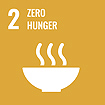
Support a healthier and more sustainable food system
CanNor is the key federal player for developing a strong, diversified, sustainable, and resilient economy for Northerners, Indigenous Peoples, communities, and businesses across the territories. In support of Canada's Food Policy, CanNor supports actions that strengthen the northern food sectors, including supporting the implementation of regional strategies and development of local producers and processors capacity (e.g. support for market development, facilities, and skills training) with the goal of increasing production and employment in the territories. This also contributes to and supports the implementation of the Arctic and Northern Policy Framework, which includes nurturing healthy families and communities as a priority.
The Northern Isolated Community Initiatives (NICI) Fund supports innovative, community-led projects for local and Indigenous food systems to help improve food security in Canada's territories. Through its three program streams, NICI enhances Indigenous and northern food security by supporting local, community-led projects that reduce dependence on the southern food industry for northern communities. In 2023-24, CanNor delivered the final phase of its innovative funding program, the Northern Food Innovation Challenge, one of the streams of the NICI Fund. This challenge supports community-led projects for local and Indigenous food production to help enhance food security in the territories, with the goal of spurring innovation and highlighting new techniques. This included social innovations or service delivery models as well as technologies to be adopted in Northern food systems. As 2023-24 marked the final year of the current NICI program, CanNor sought programs and strategies for continuing its work with other federal and territorial partners to support solutions to food insecurity in the territories. To this end, in 2023-24, CanNor engaged in Inuit-Crown partnership committees and with other regional development agencies (RDAs) to enhance NICI's support to all regions of Inuit Nunangat. Specifically, CanNor worked with Atlantic Canada Opportunities Agency (ACOA) and Canada Economic Development for Quebec Regions (CED) to expand NICI resulting in a budget of $14.9 million over three years, starting in 2023-24 for the three RDAs.
Implementation strategies supporting the goal
This section is for implementation strategies that support the goal "Support a Healthier and More Sustainable Food System" but not a specific Federal Sustainable Development Strategy (FSDS) target.
Implementation strategy: Enhancing Indigenous and Northern Food Security
Departmental action: Investments in Strengthening Northern Food Security
Continue to support innovative, community-led projects for local and Indigenous food systems to help improve food security in Canada's territories
Performance indicator: Number of projects approved that improve food security
- Starting point: 10 projects in 2022-2023
- Target: 15 projects approved annually
How the departmental action contributes to the FSDS goal and target and, where applicable, to Canada's 2030 Agenda National Strategy and Sustainable Development Goals (SDGs):
The Northern Isolated Community Initiatives Fund helps strengthen and support Indigenous and northern food systems in three territories by supporting community-led projects, with funding for equipment such as community freezers, greenhouses, local food production projects, and skills training for local and Indigenous food producers.
Northern Isolated Community Initiatives Fund has two program streams:
Stream 1A - (Support for Agriculture and Food Businesses) –supports agriculture and agri-foods SMEs, social enterprises and communities to undertake specific activities (e.g. introduction of alternative food delivery or storage methods) to enhance current and new business operations.
Stream 1B - (Northern Food Innovation Prize) –supports the stages of the Northern Food Innovation Prize. Strategies could include the identification; incubation; and testing of innovative ideas.
Stream 2 - (Support for Northern Food Working Group and Initiatives) –projects proposed by the territorial government Northern Food Working Group that support northern food security. Projects are complementary to funding provided by Agriculture and Agri-Food Canada through the Local Food Infrastructure Fund.
The Northern Isolated Community Initiatives Fund directly supports the Community Development Program of the Departmental Results Framework and the result of "People and communities participate in the economy of the territories".
Associated Canadian Indicator Framework (CIF) targets or ambitions and/or Global Indicator Framework (GIF) targets:
- CIF Ambition/Target: Canadians have access to sufficient, affordable and nutritious food
- GIF Target:
- 2.3: By 2030, double the agricultural productivity and incomes of small-scale food producers, in particular women, Indigenous Peoples, family farmers, pastoralists and fishers, including through secure and equal access to land, other productive resources and inputs, knowledge, financial services, markets and opportunities for value addition and non-farm employment
- 2.4: By 2030, ensure sustainable food production systems and implement resilient agricultural practices that increase productivity and production, that help maintain ecosystems, that strengthen capacity for adaptation to climate change, extreme weather, drought, flooding and other disasters and that progressively improve land and soil quality
Results achieved: 19 approved projects in 2023-24
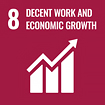
Encourage inclusive and sustainable economic growth in Canada
CanNor supports businesses and communities incorporating clean technology and adapting technologies for the Northern environment. There is no specific program for this priority, instead, CanNor funds projects that incorporate clean technology through its various programs. CanNor's Pan-Territorial Growth Strategy prioritizes encouraging the development and deployment of new technologies and innovative practices to support continuous productivity and environmental improvements within the sector. In addition, CanNor's Northern Projects Management Office (NPMO) provides a coordinating and convening role in environmental assessments in the three territories.
Implementation strategies supporting the goal
This section is for implementation strategies that support the goal "Encourage inclusive and sustainable economic growth in Canada" but not a specific Federal Sustainable Development Strategy (FSDS) target.
Implementation strategy: Supporting Workers, Businesses and Communities
Departmental action: Investments in Clean Energy & Green Technology
Continue to support investments in clean energy projects and projects that deploy green technology
Performance indicator: Number of approved clean technology- related projects
- Starting point: 17 projects (2021-2022)
- Target: 10 projects in clean tech projects by March 31, 2028
How the departmental action contributes to the FSDS goal and target and, where applicable, to Canada's 2030 Agenda National Strategy and Sustainable Development Goals (SDGs):
CanNor supports projects that require funding to incorporate clean technology through its various funding programs.
Associated Canadian Indicator Framework (CIF) targets or ambitions and/or Global Indicator Framework (GIF) targets:
- CIF Ambition: Canadians contribute to and benefit from sustainable economic growth
- GIF Target:
- 8.2: Achieve higher levels of economic productivity through diversification, technological upgrading and innovation, including through a focus on high-value added and labour-intensive sectors
Results achieved: 2 approved projects in 2023-2024
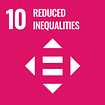
Advance reconciliation with Indigenous Peoples and take action on inequality
Canada's territories are home to 114,000 people, half of whom are Indigenous, living across 40% of Canada's landmass. As the key federal player for developing a strong, diversified, sustainable, and resilient economy for the territories, CanNor has an important role in supporting Indigenous economic development. CanNor's approach in implementing its Pan-Territorial Growth Strategy (PTGS) prioritizes collaboration with territorial governments, Indigenous organizations, industry and other stakeholders, as well as other federal departments. This collaborative approach allows for the integration of economic, social, cultural, and environmental considerations. It also allows for economic growth inside and out of the territorial capitals allowing Northerners to flourish in their own communities. Finally, this approach assists in closing the socio-economic gap for northern Indigenous Peoples.
CanNor's Northern Indigenous Economic Opportunities Program (NIEOP) supports greater participation by northern Inuit, First Nations and Métis communities and businesses in economic opportunities. Through its Community Readiness and Opportunities Planning (CROP) program, which funds capacity building to support participation in economic activities, NIEOP will advance opportunities for employment, income, and wealth creation. 2023-24 also marked the first full year of the reintroduction of core funding delivered to Indigenous communities through CROP. CanNor will remain committed to working directly with these communities to ensure they are positioned to take advantage of economic opportunities. In addition, CanNor has worked with partners, including 11 Indigenous organizations in the North, to cultivate and grow the northern innovation and entrepreneurship ecosystem through targeted supports and through CanNor's emerging economic research stream under NIEOP. This stream aims to identify economic development opportunities for territorial Indigenous community-owned development corporations, private Indigenous businesses and entrepreneurs.
CanNor's Northern Projects Management Office (NPMO) will continue to play a pivotal coordinating and convening function with industry proponents, regulators, and Indigenous communities while also supporting Crown consultation for federal regulators during the environmental assessment of new and expanding major projects in the territories. Furthermore, as the host of Pilimmaksaivik, CanNor will continue its work in coordinating a whole-of-government approach to building a representative federal public service in Nunavut, as committed to under Article 23 of the Nunavut Agreement.
In addition to targeted actions in the territories, CanNor will work with other federal departments to help advance broader Government of Canada commitments, including implementing the United Nations Declaration on the Rights of Indigenous Peoples Act (particularly aspects pertaining to economic development) and the Arctic and Northern Policy Framework (ANPF). Some of the priorities of the ANPF that overlap with CanNor's priorities include "advancing reconciliation and improving relationships between Indigenous and non-Indigenous Peoples" and "creating jobs, fostering innovation and growing Arctic and northern economies". Relevant goals and objectives of the ANPF include:
- "Goal 1: Canadian Arctic and northern Indigenous Peoples are resilient and healthy", with objectives such as ending poverty, eradicating hunger, closing the gaps in education outcomes, and providing ongoing learning and skills development opportunities, including Indigenous-based knowledge and skills;
- "Goal 2: Strengthened infrastructure that closes gaps with other regions of Canada", including the objective to strengthen community-level infrastructure and social infrastructure;
- "Goal 3: Strong, sustainable, diversified and inclusive local and regional economies", which includes all the objectives under this goal, such as increasing Indigenous participation in the economy, growing the northern and Arctic economy, providing the necessary supports to help businesses grow, etc.;
- "Goal 4: Knowledge and understanding guides decision-making", including reducing barriers to accessing research funding for Indigenous knowledge holders and organizations; and
- "Goal 8: Reconciliation supports self-determination and nurtures mutually respectful relationships between Indigenous and non-Indigenous Peoples", which includes the objective to work with Indigenous governments and organizations, provinces, territories and other partners to close socioeconomic gaps between Arctic and northern Indigenous Peoples and other Canadians.
CanNor outsources its procurement services through a Memorandum of Understanding with Indigenous Services Canada (ISC). In collaboration with ISC, CanNor will examine planned procurements to identify opportunities for Indigenous businesses, support the participation of Indigenous business to compete for contract awards, and contribute to the enhancement of oversight, planning and reporting mechanisms specific to Indigenous procurement. Finally, CanNor contributes to Indigenous economic development and reconciliation through participation in the Inuit-Crown Partnership working committees, collaboration with other RDAs to enhance supports across Inuit Nunangat, and through determination of how best to implement the National Indigenous Economic Strategy recommendations in the territories.
Target theme:
Advancing reconciliation with First Nations, Inuit, and the Métis communities
Target:
Between 2023 and 2026, and every year on an ongoing basis, develop and table annual progress reports on implementing the United Nations Declaration on the Rights of Indigenous Peoples Act (Minister of Justice and Attorney General of Canada)
Implementation strategy: Implementing the United Nations Declaration on the Rights of Indigenous Peoples Act
Departmental action: Indigenous Co-operation and Consultation
Consult and cooperate with Indigenous Peoples on the development of new/amended policies and programs
Performance indicator: Percentage of new/amended policies and programs that included a consultation and cooperation process with Indigenous peoples.
- Starting point: 100% in 2022-2023
- Target: 100% by 2027
How the departmental action contributes to the FSDS goal and target and, where applicable, to Canada's 2030 Agenda National Strategy and Sustainable Development Goals (SDGs):
CanNor works in the territories to support the conditions for a sustainable, diversified and innovative economy in collaboration with Indigenous peoples. Indigenous communities are engaged in the development of new policies and programs. For example, in the development of a new economic research stream for the Northern Indigenous Economic Opportunities Program (NIEOP) in 2023-24, Indigenous partners were extensively engaged throughout the process.
Associated Canadian Indicator Framework (CIF) targets or ambitions and/or Global Indicator Framework (GIF) targets:
- CIF Ambition: Canadians live free of discrimination and inequalities are reduced
- GIF Target:
- 10.2 By 2030, empower and promote the social, economic and political inclusion of all, irrespective of age, sex, disability, race, ethnicity, origin, religion or economic or other status
- 10.3 Ensure equal opportunity and reduce inequalities of outcome, including by eliminating discriminatory laws, policies and practices and promoting appropriate legislation, policies and action in this regard
- 10.4 Adopt policies, especially fiscal, wage and social protection policies, and progressively achieve greater equality
Results achieved: 50% in 2023-24
CanNor had two amended Terms and Conditions for two separate programs in 2023-24. For the Northern Indigenous Economic Opportunities Program (NIEOP)'s new stream, focus groups were ran to inform the implementation of this new stream, including engagement with 32 organizations, of which 11 were Indigenous organizations. Indigenous organizations included 8 regional and 3 national organizations, with a mix of organizations based in NT, Yukon and Nunavut, and included First Nations, Inuit and Metis organizations.
The Tourism Growth Program amended an existing Terms and Conditions; no engagement was done as amendments only included allowing costs to be eligible on a retroactive basis and expanding stacking limits up to 100% for commercial projects with Indigenous recipients.
Implementation strategies supporting the goal
This section is for implementation strategies that support the goal "Advance reconciliation with Indigenous Peoples and take action on inequality" but not a specific FSDS target
Implementation strategy: Indigenous Economic Development & Entrepreneurship Support
Departmental action: Increasing participation and opportunities for Indigenous communities
Continue to support greater participation by northern Inuit, First Nations and Métis communities and businesses and enable them to pursue opportunities for employment, income, and wealth creation
Performance indicator: Number of Indigenous-led projects funded by NIEOP
- Starting point: 2021-2022: 21 projects
- Target: 61 projects annually
How the departmental action contributes to the FSDS goal and target and, where applicable, to Canada's 2030 Agenda National Strategy and Sustainable Development Goals (SDGs):
CanNor's Northern Indigenous Economic Opportunities Program (NIEOP) supports greater participation from Indigenous groups and enable them to pursue opportunities for employment, income, and wealth creation. Its design reflects the continuous commitment to Indigenous economic self-determination. Through core funding and project funding, NIEOP will continue to provide long-term support to Indigenous communities and businesses, thus advancing the Government of Canada's priority of Indigenous Economic Reconciliation.
NIEOP is made up of two program streams: The Community Readiness and Opportunities Planning (CROP) program and The Entrepreneurship and Business Development (EBD) program.
CROP project funding provides project-based support to First Nations, Inuit and Métis communities and organizations, including organizations providing business development, financial or economic development services under this authority, for capacity and readiness activities so that communities are able to plan for, pursue and participate in economic opportunities. EBD assists Indigenous entrepreneurs, Indigenous businesses and Indigenous organizations in the pursuit of economic opportunities for the benefit of Indigenous people. The stream includes project-based support for activities that facilitate the establishment or expansion of Indigenous businesses.
Associated Canadian Indicator Framework (CIF) targets or ambitions and/or Global Indicator Framework (GIF) targets:
- CIF Ambition: Canadians live free of discrimination and inequalities are reduced
- CIF Indicator: Number of Indigenous governments, Indigenous organizations and northern communities directly supported (i.e., funded) to: enhance their planning capacity, conduct feasibility studies, or promote partnership opportunities.
- GIF Target:
- 10.2 By 2030, empower and promote the social, economic and political inclusion of all, irrespective of age, sex, disability, race, ethnicity, origin, religion or economic or other status
- 10.3 Ensure equal opportunity and reduce inequalities of outcome, including by eliminating discriminatory laws, policies and practices and promoting appropriate legislation, policies and action in this regard
Results achieved: 62 projects funded in 2023-24
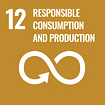
Reduce waste and transition to zero-emission vehicles
CanNor in compliance with the Policy on Green Procurement will support sustainable development by integrating environmental performance considerations into the procurement decision-making process through the actions described in the 2019 to 2022 FSDS "Greening Government" goal. CanNor aims to ensure all procurement specialists are trained in green procurement. CanNor is outsourcing its procurement services through a Memorandum of Understanding with Indigenous Services Canada (ISC).
Target theme:
Federal Leadership on Responsible Consumption
Target:
The Government of Canada's procurement of goods and services will be net-zero emissions by 2050, to aid the transition to a net-zero, circular economy (All Ministers)
Implementation strategy: Strengthening Green Procurement Criteria
Departmental action: Procurement & Material Specialists Green Procurement Training
Ensure all procurement and materiel management specialists are trained in green procurement (such as, the Canada School of Public Service course on green procurement, or equivalent) within one year of being identified
Performance indicator: Percentage of procurement and materiel management specialists trained in green procurement within one year of being identified.
- Starting point: 100% in 2022-2023
- Target: 100% of procurement officers and material management specialists receive training with one year of being identified.
How the departmental action contributes to the FSDS goal and target and, where applicable, to Canada's 2030 Agenda National Strategy and Sustainable Development Goals (SDGs):
Green procurement incorporates environmental considerations into purchasing decisions and is expected to motivate suppliers to reduce the environmental impact of the goods and services they deliver, and their supply chains.
Associated Canadian Indicator Framework (CIF) targets or ambitions and/or Global Indicator Framework (GIF) targets:
- CIF Ambition:
- Canadians consume in a sustainable manner
- CIF Indicator:
- 12.2.1Proportion of businesses that adopted selected environmental protection activities and management practices
- GIF Target:
- 12.7 Promote public procurement practices that are sustainable, in accordance with national policies and priorities
Results achieved: 100% in 2023-24
The above results refers to headquarters only. CanNor's procurement is delivered by ISC, and ISC's procurement is centralized at the department's headquarters.
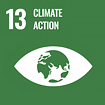
Take action on climate change and its impacts
Through its multiple programs related to climate change and climate resilience, Canadian Northern Economic Development Agency (CanNor) is contributing to Goal 13. CanNor will implement the Greening Government Strategy by improving climate resilience. CanNor will do this by continuing to raise awareness internally on how climate change impacts programs, operations and policies in the North. CanNor also funds projects that incorporate clean technology through its various programs.
Target theme:
Federal Leadership on Greenhouse Gas Emissions Reductions and Climate Resilience
Target:
The Government of Canada will transition to net-zero carbon operations for facilities and conventional fleets by 2050 (All Ministers)
Implementation strategy: Greening Government Strategy
Departmental action: Climate Change Training
Ensure all relevant employees are trained on assessing climate change impacts, undertaking climate change risk assessments, and developing adaptation actions within one year of being identified
Performance indicator: Percentage of relevant employees trained on assessing climate change impacts, undertaking climate change risk assessments, and developing adaptation actions within one year of being identified
- Starting point: New initiative to start in June 2024
- Target: 100% trained by 2026
How the departmental action contributes to the FSDS goal and target and, where applicable, to Canada's 2030 Agenda National Strategy and Sustainable Development Goals (SDGs):
Relevant employees will undergo training, such as through the Canada School of Public Service, to understand climate impacts and develop program and policies that adapt to climate change.
Associated Canadian Indicator Framework (CIF) targets or ambitions and/or Global Indicator Framework (GIF) targets:
- CIF Ambition: Canadians reduce their greenhouse gas emissions
- CIF Target: By 2030, reduce Canada's total greenhouse gas emissions by 40 to 45%, relative to 2005 emission levels. By 2050, achieve economy-wide net-zero greenhouse gas emissions.
- GIF Target:
- 13.1: Strengthen resilience and adaptive capacity to climate-related hazards and natural disasters in all countries
- 13.2: Integrate climate change measures into national policies, strategies and planning
- 13.3: Improve education, awareness-raising and human and institutional capacity on climate change mitigation, adaptation, impact reduction and early warning
Results achieved: Result available in Summer 2025
Relevant employees for climate training were identified in July 2024. They will undergo training within a year through two Canada School of Public Service courses to strengthen understanding of climate impacts and develop program and policies that adapt to climate change. The percentage of relevant employees who completed training will be reported in the next DSDS Report.
Section 3: Integrating Sustainable Development
CanNor will continue to consider the environmental effects of initiatives subject to the Cabinet Directive on the Environmental Assessment of Policy, Plan and Program Proposals, as part of its decision-making processes. Historically and for the foreseeable future, CanNor's policies, plans and programs do not trigger Strategic Environmental Assessments (SEAs). If an SEA is triggered and an initiative has undergone a detailed SEA, CanNor will release a statement on the results of the assessment on its website. The purpose of the public statement is to demonstrate that the environmental effects, including the impacts on achieving the FSDS goals and targets, of the approved policy, plan or program have been considered during proposal development and decision making.